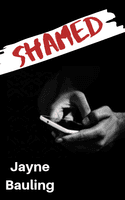Teenagers have strong feelings, and experience peer pressure powerfully. They often can’t think through possible consequences. So, teenagers do reckless things – like sending a nude selfie. This is all because teenage brains are not fully developed. Time Magazine explains:
“That means the prefrontal cortex, the area of the brain involved in decision-making, planning and self-control, is the last part to mature. … signals are not getting to the back of the brain fast enough to regulate their emotions. It’s why risk-taking and impulsive behavior are more common among teens and young adults.” Read the whole article here.
Social media adds a whole new dimension to this impulsiveness. Almost everyone has a phone. Something can be sent in an instant – before thinking it through. Then it can be instantly shared. So social media can magnify something – a mistake – hugely. And you can’t take any of it back: the genie is out of the bottle.
Lamulile herself describes her teen emotions like this: “I was so in love with him, so scared of doing the wrong thing. It was like I lost my mind, I couldn’t think, only feel.”
Now look at this: “Jasmine turns and rushes away. It’s started, the collapse of my life.”
This is the same heightened teen emotions playing out. It is not ‘the collapse of my life’. It is a temporary setback – if only every regretful teen could know that, and be helped, not shamed. Later she even thinks: “I wish I was dead.” Horrifyingly, social media shaming and bullying has literally made many young people depressed or suicidal. We all need to take the messages in a story like Shamed very seriously.
Lamulile is shamed by a boy she broke up with. The character of Dambisa is a great example of the modern catch phrase: ‘Toxic masculinity’. It means having a poisonous, harmful approach to simply being a male. The sort of male who demands a warped type of respect only because of his gender: “… what should we call it? My revenge? Too many of these females disrespecting us men these days. We need to teach them.”
Mr Lekhuleni too is a toxic, predatory male, taking advantage of the mistake: “… he looks at me like I’m dirty, but in a way that excites him.” So are the boys who sexually harass Lamulile, feeling it is now their right.
As Shiluva keeps insisting: “Doing nothing just makes people – boys, men – think they can get away with that sort of thing.” Women have made progress fighting discrimination, and the Constitution and law is on their side. However, Shamed illustrates how the fight for equality, respect and safety from men is far from over.
What is bullying? It is dominating and scaring and mocking and taking from and even physically attacking someone who has done nothing wrong, or not provoked the bully. It is often done to people who are weaker, or different, or in a less powerful situation than the bully. The students who jeer and sneer at Lamulile in her shame are bullies.
As Childline South Africa says: “ … it is very important to tell someone …Speak to a friend, parent, brother or sister, uncle or aunt and most importantly, if it happens at school, speak to your teacher.” They have clear information about bullying here.
The story, however, highlights a common problem. To stop bullying and sexual harassment you have to approach the right person – like Ms Zwane. Lamulile’s school enables the shaming and bullying she experiences. It comes from the top down. Everyone knows about sexual predator Mr Lekhuleni, and now dreadful Mrs Mzimbe responds to Lamulile’s complaint with the old, sexist cliché: “boys will be boys” and blames her.
An important message of the story is how much we need friendship and support, not blame and shame, to get through a mistake like this. First, Lamulile is given courage by her friend Shiluva: “Its harassment … You need to report it. … I’ll come with you and back you up.”
Second, she’s approached by a new anti-sexist friend, Ramano. He knows he must stop the harassment. He reassures her, “There’s more to you than what was in that photo.”
Third, a fellow-sufferer, Masana, gives the empowering assurance: You’re not alone.
Finally, Dambisa’s own oppressed sisters approach her and make it clear that it’s all about him and his abusive, patriarchal mindset, rather than about her.
The story presents us with an interesting comparison in dealing with shame. Masana and her parents agreed she must get away from the place of her shame, make a new start. Seeing Lamulile’s situation, Masana has changed her mind: “But now … now I think I should have stayed and faced what was happening, and maybe even have found a way to stop it. … we have a value beyond our mistakes, if you get what I mean.”
And indeed, the end of the story is uplifting, when Lamulile rises above her shame, her one mistake, and reaffirms to her school community the whole person she is. She, in a way, shames those who have shamed and bullied her. In doing so, she teaches them a life lesson too: “I can face the people who matter, look them in the eye and not feel shame. … But sometimes I lift my eyes and face the mockers too. It feels good, especially if some of them fall quiet, or slip away from the crowd.”
To end, heed Shiluva: “Sisters need to stand together when boys are being trash like this.”







